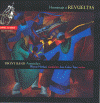20ste Eeuw Tip
 Revueltas - Homenaje A Revueltas
Revueltas - Homenaje A RevueltasEbony Band Amsterdam
Silvestre Revueltas: Homenaje a Revueltas: Ebony Band Amsterdam/Herbers Andrew Clements There have been several important collections of the music of Silvestre Revueltas (1899-1940) released during the past decade, most notably the one issued by Sony and conducted by Esa-Pekka Salonen. But his strikingly original music - the finest to come out of Mexico so far - remains very much a minority interest. Why he has been neglected for so long is hard to understand, because Revueltas's finest works - many of them included on this latest issue, which consists of recordings made at a public concert in Holland in November last year - have musical charm, humour and an originality that ranks him among the leading composers from the Americas in the period between the two world wars. This collection is described as a survey of his "chamberworks", but the term is applied quite loosely, and some of Revueltas's authentic chamber pieces, such as the string quartets, are not included at all. His best known work, Sensemayá, is played in the original 1937 version for 15 instruments rather than the later one for full orchestra. The smaller-scale scoring only emphasises its vivid musical fusion of the raw-edged sound of Mexican mariachi bands and the modernism of Varčse and Stravinsky. Masterpieces such as Ocho por Radio (1933) and the three-movement Homenaje a Federico García Lorca (1936) are here too, all of them played with just the right rhythmic energy and awareness of instrumental colour. But those pieces are included on nearly every Revueltas collection; it's the rarities on this disc that make it special. There's the study-like set of Pieza Para Doce Instrumentos, composed in 1929 shortly after the composer returned to Mexico from the US, and Planos of 1934, the nearest thing to unvarnished modernism that he ever attempted. These lie alongside pieces reconstituted after his death, such as the scraps of incidental music for the satirical play Esta Era un Rey, one of his final scores in 1940, and Hora de Junio, composed in 1938 to accompany readings of three sonnets by Carlos Pelicer, whom Revueltas had met when he went to Spain during the civil war in in 1937. How much of the latter is Revueltas's own work and how much the result of "editing" by his protege, José Limantour, is hard to determine, for Revueltas's music remains plagued with textual discrepancies. Even a relatively familiar piece like the Lorca tribute exists in two versions. On this disc, however, the Ebony Band reconcile these for their performance, reasoning - quite correctly - that it is the boundless freshness and energy of the music that matters most of all, and defines Revueltas's importance.
20ste Eeuw Tip Archief





